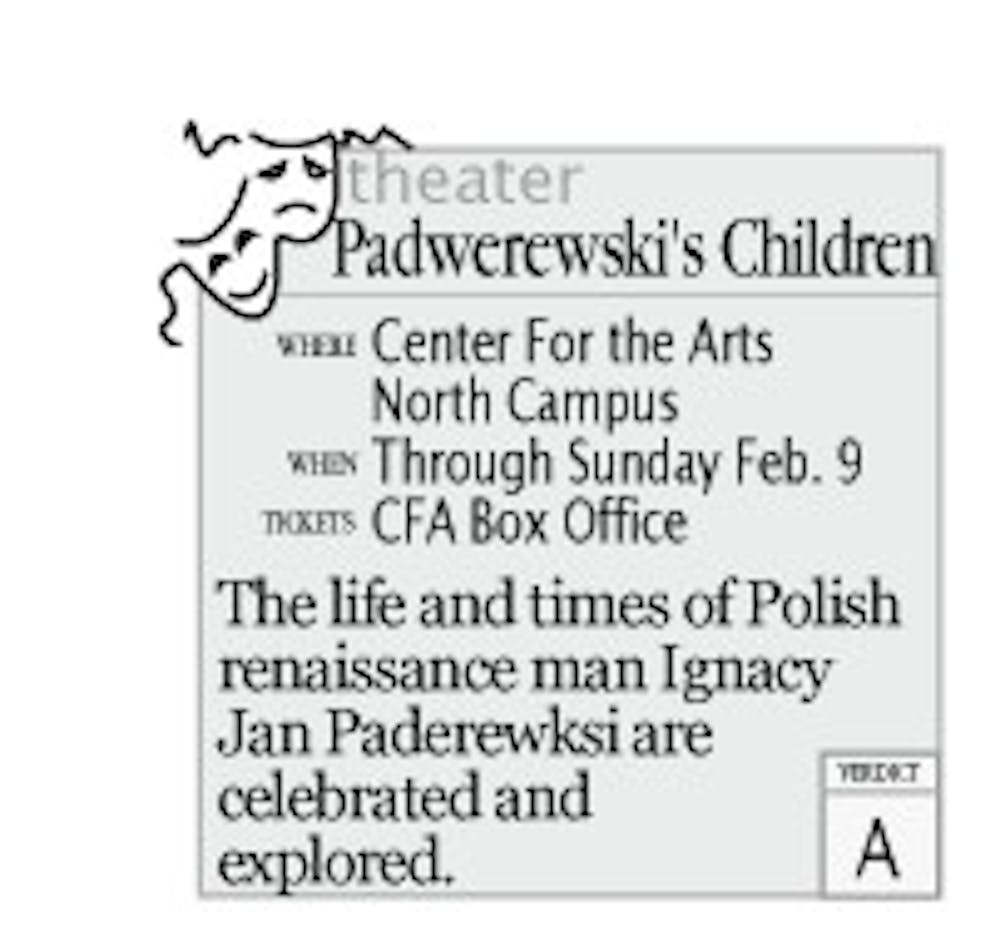Hailing from Poland, the famous composer, pianist, statesman and philanthropist Ignacy Jan Paderewski was a truly exceptional influence on both politics and music.
Kazimierez Braun, a professor in the department of theater and dance, has written and directed the department's latest production, "Paderewski's Children," as an acknowledgment of and tribute to the life of Paderewski.
The Center for the Arts Black Box Theater, an intimate location for an emotional play, is utilized nicely. The room is filled with a stage at each end, with rows of seating in between for the actors' use.
In the first act, a wealthy Paderewski is stationed at the ill-supplied Polish Kosciuszko Army's Niagara-on-the-Lake WWI training camp. Lieutenant John Chwalski (played by Pawel Chomczyk, a professional puppeteer from Poland) waits for the arrival of his soldiers to prepare a surprise for Paderewski (also referred to as the Maestro) with a playful performance about his life for him and his wife.
"What better way to entertain an artist than with art?" said an enthusiastic Chwalski.
However, the form of entertainment was small in comparison to the Maestro. With the use of a perfectly sculpted replica of Paderewski, the small wooden figure attached to strings was clothed in a black tailcoat tuxedo, glossy shoes and even the same golden-red untamed hair. Chwalski insisted on the marionette.
"No actor would dare play such a personality as Maestro," said Chwalski.
Adding touches of comic relief and drama with the marionette, the performance within the play served as a dramatized timeline highlighting both good and bad moments throughout his illustrious life.
Making the segue through the various moments of his life was second Lieutenant Zgmunt Dygant, played by Igor Lipinski, a visiting pianist from Poland who played pieces from composers like Paderewski and Chopin.
Listening to Dygant's melodies coming from beside the stage, the music appeared to be flowing from the marionette's miniature piano on stage while Chwalski manipulated the puppet to realistically imitate Dygant's every note.
As the scene closes without the Maestro's appearance, Chwalski haphazardly falls in love with Mary (played by sophomore musical theater major Nicole Casseri).
With such a sudden shift of focus, the setting for the second act changes as well. Redirecting the audience to another stage, the story moves ahead to WWII when Poland was under Nazi rule.
In the humble but respectable house of the pianist Dygant and his wife Zofia (Jane Bacon), the scene opens with soft blue lighting to match the gentle strokes of the piano while the harsh contrast of the slowly pacing Nazis surrounding the streets captures Poland's deteriorating government.
Entertaining with the puppet once again, Chwalski's talents as a puppeteer kept the sadness at bay. Celebrating Paderewski's life became the winning force for their battle against the Nazis.
The many accolades paid to Paderewski made Braun's play unique. With the incorporating of authentic dance, live native music, camera footage and puppets (large and small), there was plenty of material.
Using all of the different components at all the right times makes the tribute very effective and lasting, paying fitting tribute to the Maestro.
"Paderewski's Children" continues at the CFA Black Box Theater through this Sunday, Feb. 29. Tickets are available at the CFA box office and all Ticketmaster locations.





